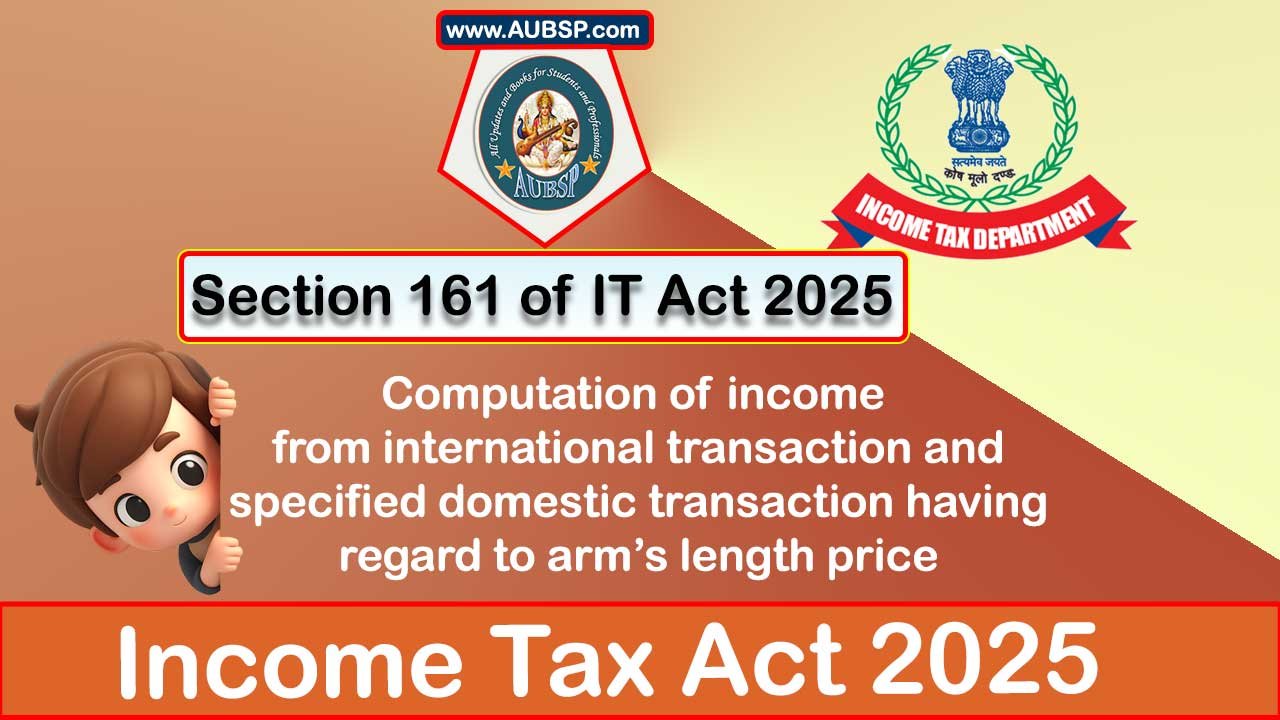Computation of income from international transaction and specified domestic transaction having regard to arm’s length price
[Section-161 as per the Income Tax Act, 2025 (this Act) w.e.f. 1st April, 2026.]
Section 161(1) of Income Tax Act 2025
161(1) Any income arising from an international transaction or a specified domestic transaction shall be determined having regard to the arm’s length price.
Section 161(2) of Income Tax Act 2025
161(2) Any allowance for any expense or interest arising from an international transaction or a specified domestic transaction shall also be determined having regard to the arm’s length price.
Section 161(3) of Income Tax Act 2025
161(3) If in an international transaction or specified domestic transaction, two or more associated enterprises enter into a mutual agreement or arrangement for––
- (a) allocation or apportionment of any cost or expense incurred or to be incurred in connection with a benefit, service or facility provided or to be provided to any one or more of such enterprises; or
- (b) any contribution to any cost or expense incurred or to be incurred in connection with a benefit, service or facility provided or to be provided to any one or more of such enterprises,
the cost or expense allocated or apportioned to, or, contributed by, any such enterprise shall be determined having regard to the arm’s length price of such benefit, service or facility.
Section 161(4) of Income Tax Act 2025
161(4) The provisions of this section shall not apply if the determination under sub-section (1) or (2) or (3) has the effect of reducing the income chargeable to tax or increasing the loss, computed on the basis of entries made in the books of account in respect of the tax year in which the international transaction or specified domestic transaction was entered.
FAQs on Section 161 of Income Tax Act 2025
What does Section 161(1) mandate for international and specified domestic transactions?
It mandates that income arising from such transactions must be computed having regard to the arm’s length price.
Are expenses or interest covered under this section?
Yes, Section 161(2) states that allowances for any expense or interest from such transactions must also be determined at arm’s length price.
What is meant by arm’s length price in this context?
Arm’s length price is the price that would be charged between unrelated parties in an open market for similar transactions.
Does Section 161 apply to cost-sharing arrangements between associated enterprises?
Yes, Section 161(3) applies to mutual agreements between associated enterprises for allocation or contribution to expenses or costs related to benefits, services, or facilities.
How is the cost allocated or contributed under such agreements evaluated?
It must be determined with reference to the arm’s length price of the benefit, service, or facility provided.
Can associated enterprises freely determine the allocation of expenses under mutual agreements?
They can enter into mutual agreements, but the actual cost allocated or contributed must conform to the arm’s length principle.
What if the arm’s length computation reduces the taxable income or increases a loss?
As per Section 161(4), in such cases, the provisions of Section 161 will not apply.
Is it mandatory to compute both income and expenditure at arm’s length price for international and specified domestic transactions?
Yes, both income and allowances for expenses or interest must be computed considering the arm’s length price.
Does this provision override book entries for the year?
Yes, if book entries lead to reduced taxable income or increased loss, Section 161 overrides them unless the effect is neutral or increases income.
Are specified domestic transactions treated similarly to international transactions under Section 161?
Yes, they are treated on par and subject to arm’s length pricing rules.
When is Section 161 applicable from?
It applies from 1st April 2026 onwards.
What is the objective of Section 161?
The objective is to ensure that income, expense, or cost-sharing between associated enterprises is not distorted to evade taxes and reflects market-based pricing.
Is Section 161 anti-avoidance in nature?
Yes, it serves as a transfer pricing anti-avoidance mechanism ensuring fair pricing in related-party transactions.
Do all mutual agreements between associated enterprises fall under Section 161(3)?
Only those related to cost or expense allocation or contributions for shared benefits, services, or facilities are covered.
Can loss be artificially increased by applying arm’s length price?
No, Section 161(4) prohibits such adjustment if it increases loss or reduces income.
Who needs to comply with Section 161?
Any person entering into international transactions or specified domestic transactions with associated enterprises.
Are transactions between unrelated parties subject to Section 161?
No, Section 161 applies only to associated enterprises.
Does Section 161 require documentation or audit?
While Section 161 itself does not mention it, compliance typically requires documentation to justify the arm’s length price, aligned with other provisions of this Act.
What happens if arm’s length price is not applied?
The tax authority may recompute the income or disallow expenses, leading to additional tax liability.
Can a taxpayer challenge an adjustment made under Section 161?
Yes, subject to procedures under this Act, a taxpayer can dispute adjustments through appeals.

